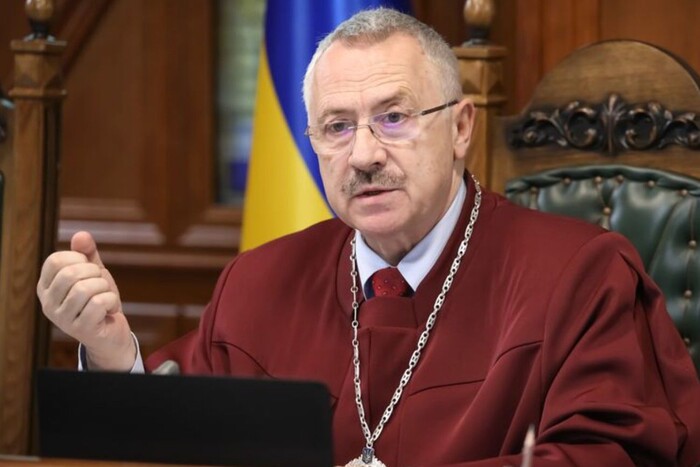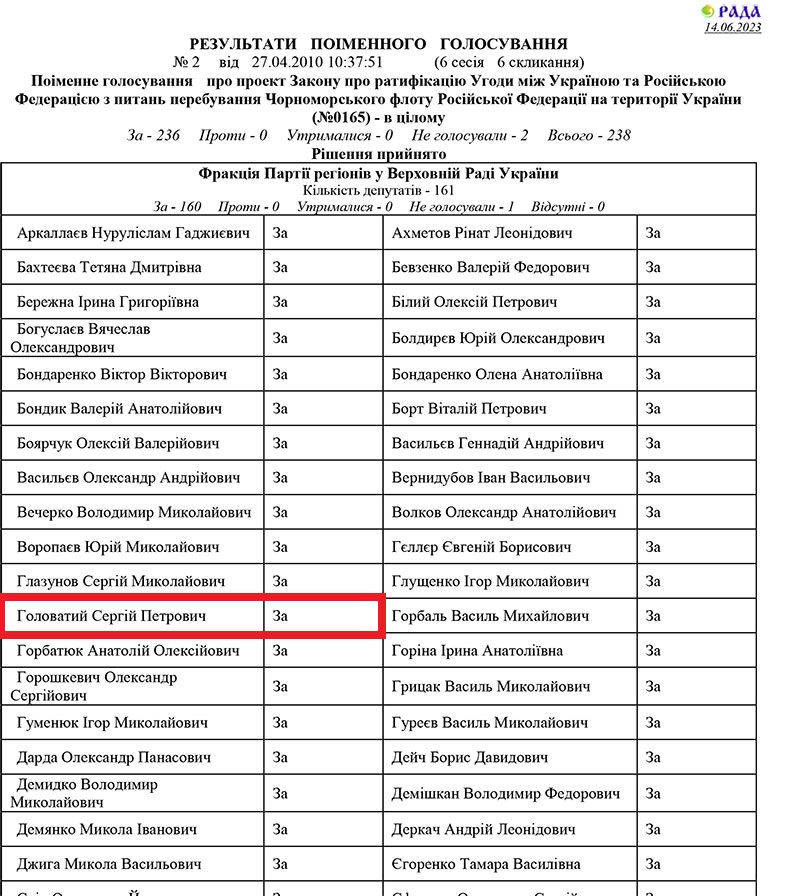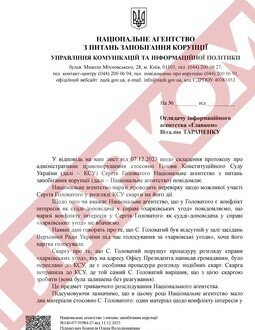Конституционный суд исследует, кто приютил Черноморский флот России в Украине и …
Большая палата Конституционного суда 5 декабря продолжила рассмотрение обращения нардепов о конституционности Соглашения между Украиной и Россией о базировании Черноморского флота РФ на территории Украины. Производство находится на начальной стадии. На предыдущем заседании, которое состоялось в сентябре, постоянный представитель Верховной Рады в Конституционном суде, нардеп от «Слуги народа» Максим Дырдин заявил отвод судье-докладчику Головатому. Большинство судей отказали в удовлетворении отвода. И тут же споткнулись о следующий отвод.
На этот раз против участия судьи Головатого в этом деле выступил представитель президента в Конституционном суде Сергей Дембовский. Оценку его аргументам снова должны дать судьи Конституционного суда. И среди них, по данным источников «Главкома», точно есть те, кто поддерживает отвод своего коллеги Головатого.

«На судье Головатом висит голос, отданный за ратификацию «харьковских соглашений». Поэтому у него есть идея: перевести рассмотрение производства в закрытую часть, и, как судья-докладчик, предложить коллегам поддержать проект решения о признании неконституционным Соглашение о пребывании Черноморского флота РФ на территории Украины. Этим самым он себя реабилитирует». Такую версию в разговоре с «Главкомом» выдвинул один из бывших судей Конституционного суда.
«Харьковские соглашения»
Судья Конституционного суда, а ныне исполняющий обязанности председателя суда Сергей Головатый является докладчиком в конституционном производстве по обращению 49 народных депутатов. В конце марта этого года избранники направили в Конституционный суд документ, в котором просили дать заключение о конституционности Соглашения между Украиной и Россией по вопросам пребывания Черноморского флота России на территории Украины. Указанное скандальное соглашение стало одним из первых шагов навстречу России Виктора Януковича, избранного президентом Украины в начале 2010 года.
21 апреля 2010 года в Харькове Янукович и тогдашний президент России Дмитрий Медведев скрепили этот документ своими подписями. 27 апреля Соглашение ратифицировали Верховная Рада и Госдума РФ.
«Харьковские соглашения» продлили срок пребывания Черноморского флота России продлен на 25 лет, до 28 мая 2042 года с последующим автоматическим продлением на следующие пятилетние периоды, если ни одна из сторон не уведомит письменно другую сторону о прекращении действия Соглашения не позднее, чем за год до завершения срока действия. Оплата за пребывание флота состоит из ежегодных платежей в $100 млн в год, начиная с 2017 года, а также из дополнительных средств, получаемых за счет снижения с даты вступления в силу настоящего Соглашения цены в размере до $100 долларов от установленной действующим контрактом между НАК «Нафтогаз» Украины и ОАО «Газпром», на каждую тысячу кубометров газа, поставляемого в Украину. При цене $333 и выше за тысячу кубометров газа снижение составит $100, при цене ниже $333 снижение составит 30% от такой цены.
Весной 2014 года после оккупации Крыма Государственная Дума России в одностороннем порядке денонсировала Соглашение с Украиной о базировании Черноморского флота РФ на территории украинского полуострова…
Пока в деле объявлен перерыв, «Главком» разбирался, что же не так с судьей Сергеем Головатым и почему его персона оказалась настолько контраверсионной именно в этом деле.
Проблема №1. Голосование Головатого за флот РФ
По иронии судьбы, в далеком 2010 году нынешний судья Сергей Головатый был народным депутатом VI созыва и входил во фракцию провластной Партии регионов. В день «Х» он отдал свой голос за ратификацию Соглашения между Украиной и Россией по вопросам пребывания Черноморского флота России на территории Украины.
«Сергей Головатый лично не голосовал за «харьковские соглашения», сработала его карточка или ее дубликат. Парламент голосовал за эти соглашения именно в тот день, когда ПАСЕ выбирала судей Европейского суда по правам человека от Украины (ЕСПЧ). В тот день я был в Страсбурге и собственными глазами видел Головатого на расстоянии примерно 100 метров. По квоте от Украины в ЕСПЧ были выдвинуты три кандидата: Сергей Головатый, Анна Юдковская и Станислав Шевчук», — вспоминает в разговоре с «Главкомом» бывший председатель Конституционного суда и судья Европейского суда по правам человека от Украины в 2009-2012 годах Станислав Шевчук.

Зато факт остается фактом — голос Головатого за ратификацию Соглашения зафиксировала система «Рада». И этим фактом, похоже, много лет не очень переживал и сам достопочтенный судья. Это подметил постоянный представитель Верховной Рады Украины в Конституционном суде Украины Максим Дырдин, отметив об этом в заявлении об отводе Головатому. По словам Дырдина, в те времена (во время правления команды Виктора Януковича — «Главком») существовала практика: если парламентарий не согласен с результатами своего голосования, например, отсутствовал, неправильно сработала карточка или вообще не сработала, он писал заявление на председателя Верховной Рады, в котором приводил объяснения и просил его голос учитывать или не учитывать, или объяснял, как на самом деле он голосовал. Далее это заявление отображается под общим волеизъявлением народных избранников за тот или иной законопроект.
Однако, как отметил Дырдин, нардеп Сергей Головатый не сделал никаких попыток, чтобы отозвать, подать заявление о неучете его голоса. Тем более, что Головатый был в то время в командировке, поэтому мог заявить публично: не согласен, что его карточку использовали без согласия во время голосования за ратификацию «харьковских соглашений». В то же время состоялось «молчаливое согласие» со стороны парламентария-судьи.
«При сложившихся обстоятельствах есть определенное сомнение в беспристрастности и объективности судьи-докладчика Сергея Головатого», — отметил представитель парламента в суде в комментарии «Главкому».
Кстати, сегодня также есть практика: когда карточка народного депутата не срабатывает или некорректно отображается его голосование при принятии законов, избранник пишет заявление на спикера Рады и просит учесть его голос так, как нужно. Заявление избранника зачитывается председательствующим на пленарном заседании сессии парламента под стенограмму. Правда, это не влияет на конечный результат, это является определенной политической позицией нардепа, пояснил Максим Дырдин.
Интересное мнение о голосовании Головатого в доме под куполом в 2010 году озвучил судья Конституционного суда в отставке, а по состоянию на апрель 2010 года также народный депутат Сергей Сас. В интервью изданию «Высокий замок» он сделал громкое заявление, мол, Головатый «продал свой голос за «харьковские соглашения».
«Если Головатый подаст на меня в суд — готов доказать, тем более со свидетелями, то, что он продал свой голос «за харьковские соглашения». Не отдал, а продал! Когда это произошло, Головатый где-то промямлил, что его карточку использовали. Но не заявил в парламенте, что отзывает свой голос. В знак протеста не вышел из фракции Партии регионов. После того голосования еще два года находился в ней. Был в политической силе, в уставе которой написано о «двуязычии» и других позорных вещах», — напомнил Сас факты из биографии нынешнего судьи Конституционного суда.
Вместе с тем надо напомнить, что в 2010 году в интервью «Главкому» тогдашний нардеп из фракции Партии регионов Сергей Головатый говорил, что с его стороны не было персонального голосования за ратификацию «харьковских соглашений». «Проголосовала» карточка, а не я», — уверял он. И добавил, что после указанного инцидента, держал у себя карту депутата и ее дубликат.
Проблема №2. Уголовное преследование за «харьковские соглашения»
Другой дамоклов меч, который нависает над судьей Сергеем Головатым — уголовные преследования всех участников, причастных к принятию Соглашения о Черноморском флоте РФ. Весной 2021 года Совет нацбезопасности и обороны поручил Службе безопасности проверить обстоятельства подготовки и ратификации «харьковских соглашений» 2010 года.
«Есть отдельное поручение СБУ выяснить обстоятельства, каким образом эти 236 депутатов голосовали по этому вопросу, и если СБУ будет считать необходимым, она должна возбудить по 111-й статье Уголовного кодекса о госизмене (дело) в отношении соответствующих лиц», — заявлял секретарь СНБО Алексей Данилов.
Как выяснил «Главком», в 2021 году действительно было открыто уголовное производство №62021000000000279. На скамье обвиняемых тогда оказалось двое бывших высокопоставленных чиновников: четвертый президент Виктор Янукович и тогдашний премьер Николай Азаров. Обвинительный акт в отношении них зашел в Печерский райсуд столицы, дело находится на подготовительной стадии рассмотрения.
Есть еще трое подозреваемых по «харьковским соглашениям»: бывшие министры юстиции, обороны и иностранных дел Александр Лавринович, Михаил Ежель и Константин Грищенко. В прошлом году Государственное бюро расследований объявило им подозрение в государственной измене. Кроме этого, следствие объявило экс-чиновников в государственный и международный розыск.
«Мотивы судебного преследования у нас могут быть разными, мы это неоднократно наблюдали в Украине. Перед тем, как мы с женой были вынуждены уехать на лечение, я дважды в Киеве давал объяснения в качестве свидетеля, пытаясь помочь следствию понять безосновательность моего привлечения к этому делу. Тогда о выдвижении мне каких-то обвинений речь вообще не шла, и только когда я уже несколько месяцев находился за пределами Украины, было составлено сообщение о подозрении, о чем мне сообщил адвокат. Какие бы ни были драйверы этого решения — политические, чьи-то личные амбиции или что-то еще — они точно не имеют ничего общего с желанием установить истину. Думаю, надо разбираться с этим в более спокойных условиях», — так комментировал «Главкому» свою позицию Константин Грищенко.
По данным источников «Главкома» в СБУ, судья Сергей Головатый также бывал на допросе по делу «харьковских соглашений». Туда он являлся как свидетель.
В комментарии «Главкому» пресс-секретарь по коммуникациям Государственного бюро расследований Татьяна Сапьян сообщила: сегодня судья Конституционного суда Сергей Головатый не имеет никакого статуса в этом уголовном производстве, поскольку на момент голосования он, как народный депутат, официально находился в командировке.
«Часть депутатов VI созыва допрашивалась в качестве свидетелей. Напомним, согласно 80 статье Конституции Украины, депутаты не несут юридической ответственности за результаты голосования или высказывания в парламенте. В то же время следователи выясняют возможные фальсификации во время голосования по ратификации «харьковских соглашений», — отметила спикер ГБР.
Проблема №3. НАПК атакует?
Заинтересовалось персоной судьи Головатого и Национальное агентство по вопросам предотвращения коррупции (НАПК). В официальном сообщении НАПК сказано: проверяется информация о совершении судьей Головатым действий в условиях реального конфликта интересов. Для этого антикоррупционный орган пытался получить в Конституционном суде соответствующие документы.
Однако запрос НАПК был проигнорирован. Это и стало основанием составления на Головатого, как исполняющего обязанности председателя суда, протокола об административном правонарушении.
Вместе с тем, управление коммуникаций Нацагентства по вопросам предотвращения коррупции по просьбе «Главкома» сообщило, что не видит конфликта интересов у Сергея Головатого как судьи-докладчика по делу «харьковских соглашений». «Головатый не поддерживал соглашения и отсутствовал в Раде в тот день. Как голосовала карточка, не знает. Итак, конфликта интересов у Головатого как судьи-докладчика по делу «харьковских соглашений» пока не видим», — сказали в НАПК.
НАПК сообщило, что не видит конфликта интересов у Сергея Головатого как судьи-докладчика по делу «харьковских соглашений»

В антикоррупционном органе добавили, что сейчас идет проверка возможного участия судьи Головатого во время заседания суда, где рассматривалась жалоба на его действия. НАПК хотело истребовать документы в Конституционном суде, чтобы проверить, но тщетно. Поэтому и пошли в суд обжаловать бездействие Головатого как исполняющего обязанности председателя суда.
Если уважаемый судья проиграет админдело, то попадет в реестр коррупционеров. А это уже клеймо не только на судейской мантии, но и вообще на многолетней карьере государственного служащего Головатого.

Вместе с тем, о потенциальном конфликте интересов упомянул в своем отводе судьи Головатому сказал представитель президента в Конституционном суде Сергей Дембовский: «Судьей Сергеем Головатым не приняты меры по опровержению информации о возможном совершении им действий в условиях реального конфликта интересов в этом деле даже по законному требованию компетентного государственного органа (НАПК — «Главком»)».
Проблема №4. Небезупречное обращение нардепов
Есть вопросы и к юридической безупречности оформления самого представления группы народных депутатов в Конституционный суд. Между прочим, на это указывали авторы отводов судьи Головатому Максим Дырдин и Сергей Дембовский. Речь идет о том, что должно быть не конституционное представление, как его оформили народные избранники, а конституционное обращение. Правда, вдогонку отправленному представлению депутаты направили в Конституционный суд дополнительные документы, в которых подчеркнули: их документ о толковании «харьковских соглашений» все же надо считать конституционным обращением.
В ходе беседы с «Главкомом» народный депутат и представитель группы избранников в Конституционном суде Соломия Бобровская сообщила: с началом вторжения РФ отдельные парламентарии обратились к Председателю Верховной Рады Руслану Стефанчуку с требованием поставить на голосование и денонсировать все международные соглашения, договоры, подписанные с Россией и Беларусью в рамках СНГ. Их насчитывается около 600, по неизвестным причинам в этом направлении нет прогресса.
«Вопрос денонсации «харьковских соглашений» и их несоответствия Конституции часто обсуждался среди коллег в Раде, особенно когда речь шла о морской безопасности. Очень странно, что против рассмотрения этого вопроса до сих пор выступает Министерство иностранных дел. Его позиция: в международных судах надеется использовать как доказательство несоблюдения со стороны России, взятых на себя обязательств выполнять Соглашение между Украиной и Россией по вопросам пребывания Черноморского флота России на территории Украины. Ведь в марте 2014 года россияне односторонне денонсировали это Соглашение. Поэтому наш МИД рассматривает это важным аргументом в международных судах как очередное нарушение со стороны РФ. С другой стороны, имеем парадокс: государство-агрессор напало на Украину, а мы до сих пор признаем действующим Соглашение о базировании Черноморского флота России в Крыму. То есть однажды мы зайдем в Крым и посадим в Севастопольской бухте российский флот?» — не понимает парламентарий.
Отдельно политик комментирует, что сейчас дело в Конституционном суде находится на определенной паузе, вероятно, затягивается путем отводов судьи Сергея Головатого. Но нужно движение в деле.
«Цель конституционного обращения группы народных депутатов — поставить точку в исторической государственной измене, которая растянулась на годы. И следствием этого стала сверхбыстрая аннексия полуострова и полномасштабная война в 2022 году. По моему мнению, эту мину еще заложил в 1997 году тогдашний украинский президент Леонид Кучма, который продлил Соглашение между Украиной и Россией по вопросам пребывания Черноморского флота России на территории Украины. А в 2010 году это было ни что иное как государственная измена, подготовка почвы для вторжения РФ», — пояснила Соломия Бобровская.
Проблема №5. Нет единства среди судей
Сложной задачей для судьи-докладчика Сергея Головатого будет и поиск голосов под решение по делу «харьковских соглашений». Нужно, как минимум, 10 голосов. Сейчас в суде работает 13 служителей Фемиды. Еще пять судейских кресел остаются вакантными, на них объявлен конкурсный отбор.
Кроме этого, более двух лет Конституционный суд живет без председателя. Это произошло после выяснения отношений между президентом Владимиром Зеленским и тогдашним главой Александром Тупицким после уничтожения Конституционным судом электронного декларирования чиновников.
В 2022 году суд объявил выборы председателя. В частности, планировалось выдвижение кандидатом судьи Виктора Кичуна. Его в свое время рекомендовал на должность судьи от фракции «Слуга народа» уже экс-представитель президента в Конституционном суде, нардеп Федор Вениславский. Однако дело до выдвижения кандидатов не дошло. Похожая история с избранием председателя повторилась в конце октября — начале ноября 2023-го: никто из потенциальных кандидатов не выдвинулся.
…5 декабря во время заседания Большой палаты Конституционного суда судья Виктор Кичун сделал неоднозначное заявление. Похоже, что он оказался по одну сторону баррикад с Максимом Дырдиным, который заявлял отвод Головатому: «У меня есть обоснованные сомнения, что мы должным образом, согласно законодательству, решили вопрос об отводе судьи, который подал постоянный представитель Верховной Рады в Конституционном суде… Я просил бы объявить перерыв и развеять мои сомнения. Кстати, такие сомнения есть и у других коллег, но они молчат». Председательствующий по этому делу судья Сергей Головатый сделал вид, что не услышал коллегу Кичуна, и передал слово другому судье…
В комментарии «Главкому» судья Конституционного суда Сергей Головатый отверг любые обвинения в свой адрес относительно конфликта интересов в деле «харьковских соглашений». «Конфликта интересов у меня не было, нет и не может быть в этом вопросе. Деятельность НАПК в этом вопросе в отношении меня я оцениваю как незаконную (с юридическими доказательствами того) и как давление на меня как судью-докладчика, а также влияние на Конституционный суд в целом как на институт», — подчеркнул судья-докладчик.
В то же время судья Конституционного суда оставил без ответа вопросы «Главкома», в частности, предпринимал ли он юридические попытки (готовил ли заявление об отзыве своего голоса или что-то другое), чтобы доказать свое неголосование за ратификацию «харьковских соглашений», будучи народным депутатом VI созыва.


